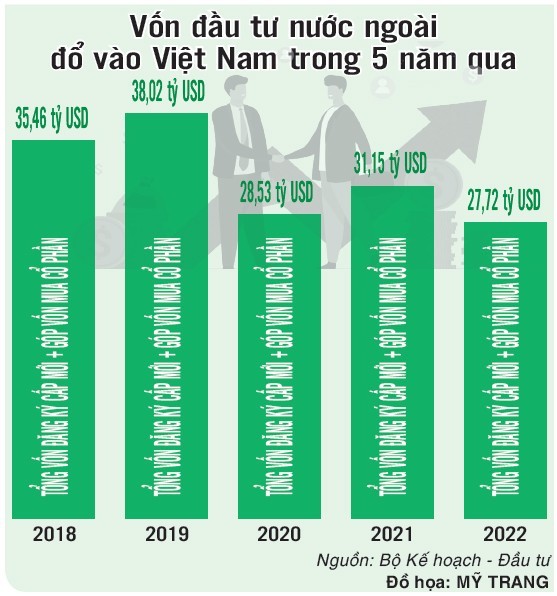 |
The Bank-Business Connection Program held by the People's Committee of HCMC in collaboration with the State Bank of Vietnam - HCMC Branch on Feb 28. (Photo: SGGP) |
Profit margins, which are already too thin, will cause businesses to struggle whenever there is a significant fluctuation in exchange rates or an increase in interest rates.
Enterprises encounter difficulties
Supporting industries are considered as the sustainable production foundation of many other manufacturing industries because they create raw materials, materials, components, and spare parts to supply the production of finished products. However, the development of this industry has faced many difficulties.
Mr. Nguyen Ngoc Hoa, Chairman of the Ho Chi Minh City Union of Business Association, shared that most supporting industry enterprises have a small scale and thin capital. The structure of loans in the operation of these enterprises accounts for 80 percent or more, with the remaining coming from their own capital.
Ms. Le Nguyen Duy Oanh, Deputy Director of the Center for Supporting Industry Development under the HCMC Department of Industry and Trade, stated that the supply chain connection activities between Vietnamese supporting industry enterprises and FDI enterprises indicate that Vietnam's supplied products are only primary products, not essential or high-tech products with exclusive characteristics.
These products will face significant price competition pressure from other enterprises in the supply chain. Therefore, domestic enterprises can only maintain profit margins below 10 percent and cannot negotiate for higher profit margins with FDI enterprises if they do not want to be eliminated from the game. As a result, if the bank lending interest rates maintain at 12-16 percent per annum, plus the increases in the USD/VND exchange rate, the cost of raw materials, transportation costs, and gasoline and oil prices from the end of 2022 until now, these companies will find it challenging to sustain their operations.
Mrs. Ly Kim Chi, Chairwoman of the Food and Foodstuff Association of HCMC, said that food enterprises faced difficulties because they had to maintain production stability while reinvesting in production technology to meet new barriers applied by export markets. Therefore, with the current high interest rate, it is hard for businesses to increase investment or reinvest.
To share difficulties with people due to the prolonged Covid-19 pandemic, most businesses in the food industry reduced their profit margins to a low level or even zero percent. By the beginning of 2022, when the pandemic situation was under control, enterprises began to restore production but had to face several problems related to input materials, gasoline prices, and highly-increased loan interest rates. Currently, many businesses have to mortgage all of their company's assets to borrow capital for production but are still struggling due to a shortage of capital to expand production.
Selling out companies
 |
Foreign investment in Vietnam for the last five years |
In reality, many companies have had to sell a portion of their shares or their entire company to investment funds or FDI companies due to difficulties. For example, 51 percent of Binh Minh Plastic Company’s shares are now owned by Thailand’s SCG Group. Ba Huan Food Joint Stock Company had to sell 25 percent of its equity. Previously, Cau Tre Export Goods Processing Joint Stock Company, VISSAN, and Minh Dat Food Company had to sell a portion of their shares or controlling shares to financial investment funds or South Korean companies.
Mr. Nguyen Ngoc Hoa said that selling out the company is a painful solution because no one wants to sell a company that has been built for 10-20 years. However, how can domestic companies survive and compete with foreign companies when the interest rates for medium- and long-term loans range from 7 percent to 16 percent per annum? Meanwhile, companies in Thailand, South Korea, and Japan only have to borrow loans at interest rates of 2-5 percent per annum.
On another aspect, many Vietnamese enterprises have chosen to keep themselves, but they are still facing tremendous pressures, especially regarding searching for orders. Mr. Phung Quoc Cuong, Director of Bao Hung Company, shared that from the beginning of 2023 until now, the three main export markets of the company, namely the US, Japan, and South Korea, have cut about 25 percent of the number of orders compared to the same period in 2022.
In the domestic market, the consumption of furniture products has also sharply decreased, leading to a large inventory at the distribution system's stores and agencies. Additionally, enterprises must deal with cheap Chinese goods that are increasingly dominating the market. As a result, the company has had to cut more than 30 percent of its workers and reduce working hours to maintain production.
Commenting on the market trend in the coming time, Mr. Nguyen Anh Duc, CEO of Saigon Co.op, said that merger and acquisition (M&A) activities would continue to take place strongly in the direction of foreign companies buying more potential domestic companies.
According to a report from the General Statistics Office, by January 2023, total registered foreign investment in Vietnam, including newly-registered and adjusted registered capital, capital contribution, and share purchases of foreign investors, reached US$1.69 billion. Previously, this figure was $27.72 billion in 2022.
Besides the selling out of many leading companies, another concern is the difficulty in controlling the inflation rate. Ms. Ly Kim Chi analyzed that in the basket of the consumer price index (CPI), the group of food and foodstuff products accounts for an extremely large proportion. The inflation rate was able to be controlled in the past because food and foodstuff companies were still in the hands of Vietnamese companies.
These companies regularly participated in market stabilization programs, especially the market stabilization program widely applied in HCMC, which helped to control inflation. However, with food and foodstuff companies weakening and falling into the hands of foreign companies, the story may be different. The consensus to participate in the market stabilization programs will be more complicated.
Dr. Can Van Luc, Member of the National Monetary Policy Advisory Council: Food and foodstuff group accounts for 33 percent of the CPI basket
In the structure of commodity and service groups that make up Vietnam's CPI, the food and foodstuff group accounts for 33 percent, while the rest is transportation, electricity, water, petroleum, and healthcare. In 2022, Vietnam managed to control inflation by proactively stabilizing food prices. The rest was achieved through actively regulating the prices of petroleum, electricity, water, and healthcare services.
Mr. Bui Van Trinh, Disruptive Events Advisory Deputy Head at Deloitte Vietnam: Consumer goods sector attracts foreign investors
In 2022, Vietnam had eight successful initial public offerings (IPOs) that raised a total of $71 million. The market's IPO appetite has shifted from real estate to industrial products and consumer goods. Vietnamese regulatory agencies have implemented many positive initiatives to enhance the transparency of financial information. We hope this will strengthen the confidence of domestic and international investors, as well as the attractiveness and vibrancy of the Vietnamese capital market.
























